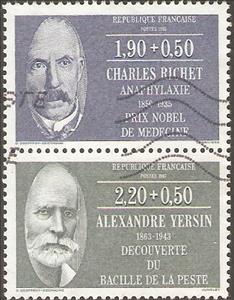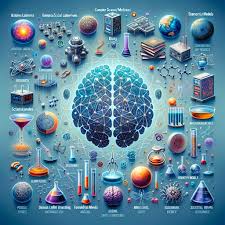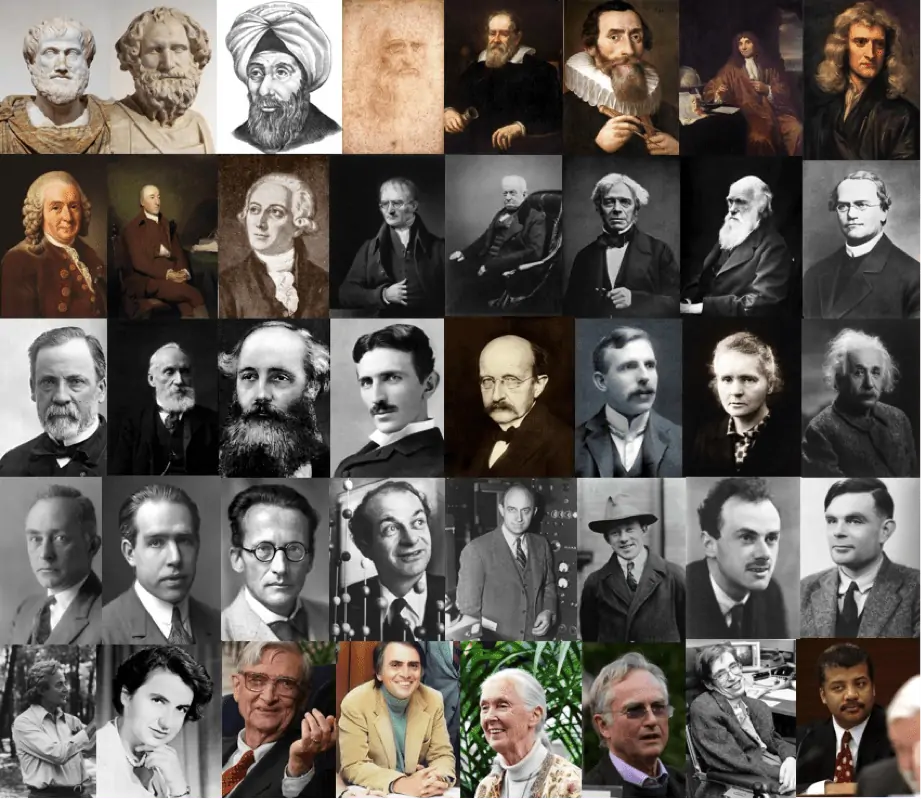Se-tenant: Charles Richet (1850-1935),Alexandre Yersin (1863-1943) (France 1987)
Charles Richet (1850-1935),Alexandre Yersin (1863-1943) (France 1987)
21 February (France ) within release Famous People (1987) goes into circulation Se-tenant Charles Richet (1850-1935),Alexandre Yersin (1863-1943) face value 3.80+1 French franc
| Se-tenant Charles Richet (1850-1935),Alexandre Yersin (1863-1943) in catalogues | |
|---|---|
| Michel: | Mi: FR S21 |
Se-tenant is square format.
Also in the issue Famous People (1987):
- Booklet Pane - Band-book of doctors and biologists face value 15.30;
- Se-tenant - Alexandre Yersin, Jamot Eugene face value 4.10+1;
- Se-tenant - Alexandre Yersin, Jamot Eugene, Jean Rostand face value 6.30+1.50;
- Se-tenant - Bernard Halpern, Jacques Monod face value 4.10+1;
- Stamp - Bernard Halpern, Jacques Monod face value 4.10+1;
- Se-tenant - Charles Richet (1850-1935) face value 1.90+0.50;
- Se-tenant - Charles Richet (1850-1935),Alexandre Yersin (1863-1943) face value 3.80+1;
- Se-tenant - Charles Richet, Alexandre Yersin, Jamot Eugene face value 6+1.50;
- Stamp - Jacques Monod (1910-1976) face value 2.20+0.50;
- Se-tenant - Jamot Eugene, Jean Rostand face value 4.10+1;
- Se-tenant - Jamot Eugene, Jean Rostand, Bernard Halpern face value 6+1.50;
- Se-tenant - Jean Rostand, Bernard Halpern face value 4.10+1;
- Se-tenant - Jean Rostand, Bernard Halpern, Jacques Monod face value 6.30+1.50;
Se-tenant Charles Richet (1850-1935),Alexandre Yersin (1863-1943) it reflects the thematic directions:
A biologist is a scientist who conducts research in biology. Biologists are interested in studying life on Earth, whether it is an individual cell, a multicellular organism, or a community of interacting populations.They usually specialize in a particular branch (e.g., molecular biology, zoology, and evolutionary biology) of biology and have a specific research focus (e.g., studying malaria or cancer).
Famous People refers to the fame and public attention accorded by the mass media to individuals or groups or, occasionally, animals, but is usually applied to the persons or groups of people (celebrity couples, families, etc.) themselves who receive such a status of fame and attention. Celebrity status is often associated with wealth (commonly referred to as fame and fortune), while fame often provides opportunities to make money.
A physician, medical practitioner (British English), medical doctor, or simply doctor is a health professional who practices medicine, which is concerned with promoting, maintaining or restoring health through the study, diagnosis, prognosis and treatment of disease, injury, and other physical and mental impairments. Physicians may focus their practice on certain disease categories, types of patients, and methods of treatment—known as specialities—or they may assume responsibility for the provision of continuing and comprehensive medical care to individuals, families, and communities—known as general practice. Medical practice properly requires both a detailed knowledge of the academic disciplines, such as anatomy and physiology, underlying diseases, and their treatment, which is the science of medicine, and a decent competence in its applied practice, which is the art or craft of the profession.
Science is a systematic discipline that builds and organises knowledge in the form of testable hypotheses and predictions about the universe.Modern science is typically divided into two or three major branches: the natural sciences (e.g., physics, chemistry, and biology), which study the physical world; and the behavioural sciences (e.g., economics, psychology, and sociology), which study individuals and societies.The formal sciences (e.g., logic, mathematics, and theoretical computer science), which study formal systems governed by axioms and rules, are sometimes described as being sciences as well; however, they are often regarded as a separate field because they rely on deductive reasoning instead of the scientific method or empirical evidence as their main methodology. Applied sciences are disciplines that use scientific knowledge for practical purposes, such as engineering and medicine
A scientist is a person who researches to advance knowledge in an area of the natural sciences





